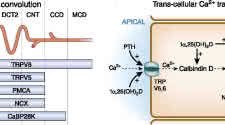High Protein Diets & Calcium Excretions Report

Advanced Health & Nutrition
A frequently mentioned side effect of high protein diets is calcium excretion. The effect is thought to occur when blood acidity increases. That acidity comes from sulfur containing amino acids such as methionine and cyste. The body then uses calcium to buffer this increased
blood acidity, but calcium is excreted as a result. Loss of calcium could be problematic for bodybuilders, particularly women. Most women aren't keen on eating large amounts of high-calcium foods, such as dairy products, because of weight-control considerations. Foods such as
milk and cheese are thought to be either too high in fat or, in the case of nonfat versions, too rich in sodium.
Many women believe that they can obtain sufficient calcium from other foods, such as vegetables. But while certain vegetables do contain calcium, they also contain substances, such as oxalate and phytic acid, that lock onto calcium and prevent its absorption into the body. For
this reason, dairy products are considered to be the most reliable food sources of calcium. The onset of osteoporosis, a bone-thinning disease more prevalent in women than in men, typically begins about age 30. The disease is subtle but progressive, leading to shattered hips,
broken vertebrae and other maladies among post- menopausal women. Osteoporosis is believed to be caused by a long-term shortage of calcium combined with a decrease in estrogen synthesis, which prevents bone loss. (Female bodybuilders who either induce chemical menopause by staying
on the estrogen-antagonist drug Nolvadex or insist on maintaining low body fat levels year-round are setting themselves up for osteoporosis. The first signs usually arrive in the form of stress fractures.
Body fat supplies one-third of the estrogen produced in a woman's body, through the conversion of adrenal androgens into estrogen by an enzyme found in fat tissue. Thus, consuming a high-protein diet would appear to be particularly dangerous to women because of o the calcium loss.
But such loss occurs only with particular protein sources that lack phosphate. Occurring naturally in most high-protein foods, phosphate prevents the protein/calcium-loss effect. Mother thing to watch out for is sodium chloride, or common table salt. Salt also increases calcium
excretion, but is usually not a major factor in bodybuilding diets, except during the off-season. Even then, few bodybuilders will salt their foods with the gusto of the average couch potato.
Another way to combat calcium loss while on a high-protein diet is by neutralizing excess blood acidity. Higher blood acidity occurs after consuming phosphate-free protein drinks and amino-acid supplements. Thing sodium bicarbonate, or common baking soda, can rapidly provide a
buffer against increased blood acidity. But then you have to deal with the bloating caused by the sodium portion of the bicarb. A better solution might be potassium bicarbonate. A study reported in Nutrition Research (14:991-1002, 1994) compared sodium bicarb to potassium bicarb
for the prevention of excessive calcium loss in subjects on high-protein diets. Before adding either of the two buffers, the study's authors found that adding 60 grams of protein to a diet already containing 100 grams of protein increased calcium excretion by 40%. The study showed
that while sodium bicarb did reduce calcium excretion during a high-protein diet, much of this benefit was offset by the sodium portion of the bicarb.
In contrast, the potassium bicarb decreased calcium excretion by 40%. In addition to the buffer effect offered by potassium bicarb, the potassium itself may exert an independent effect by helping the body retain phosphate. This would suppress calcitriol, a vitamin D compound
synthesized from cholesterol in the kidneys that is involved in calcium metabolism. It's unclear why the authors of this study would think that calcitriol suppression would lead to calcium retention, since calcitriol itself retains both calcium and phosphorus.
Interestingly, the study showed that potassium bicarb does not prevent calcium excretion in rats. This illustrates just one of the many differences in how rats and humans handle nutrients. Keep that in mind next time someone tries to take the results of a study using rats and
apply them to humans.